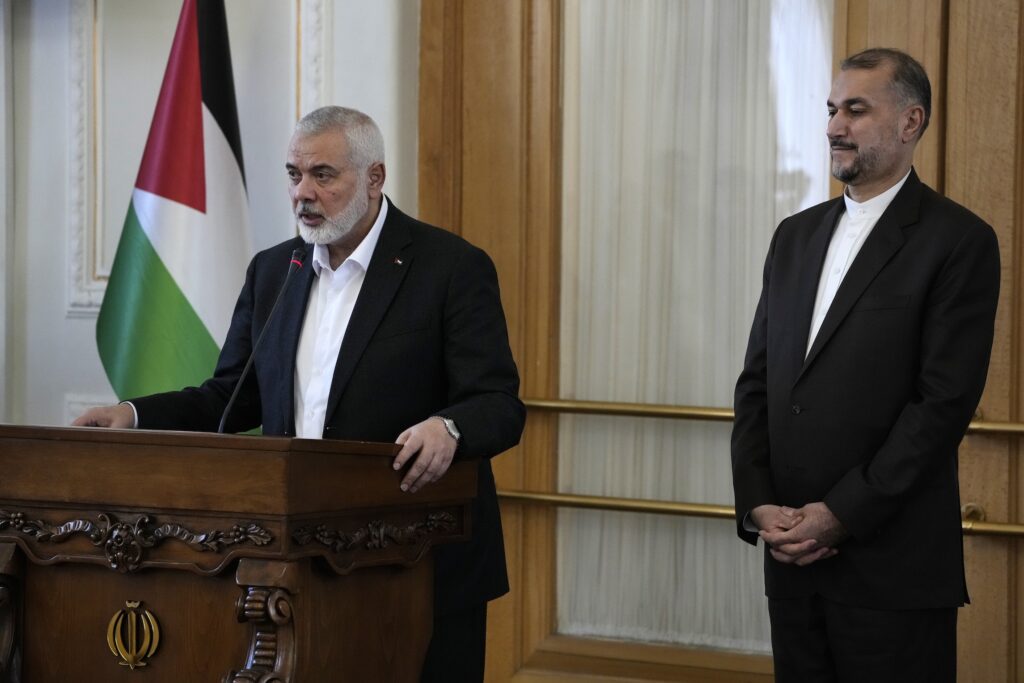
Hamas renewed its demands for a full ceasefire and Israel’s “withdrawal from the Gaza Strip” in a blow to hostage release negotiations that Israeli officials implicitly blamed on the United States.
“The Hamas movement informed the mediator brothers a short while ago that the movement is adhering to its position and vision that it presented on March 14,” Hamas announced via social media, per a Jerusalem Post translation.
That statement signified a rejection of an “American compromise proposal” in favor of “its extreme demands,” according to Israeli Prime Minister Benjamin Netanyahu’s office. Israeli officials cited the terrorist organization’s recalcitrance as justification for Jerusalem’s anger over President Joe Biden’s refusal to veto a United Nations Security Council resolution, adopted Monday, that called for a ceasefire without making that truce conditional on the release of Israeli hostages held by Hamas.
“It’s not surprising that Hamas decided to reject the latest proposal that was put forth by the Americans,” said Israeli Strategic Affairs Minister Ron Dermer, whose trip to the U.S. was canceled by Netanyahu in response to the U.S. decision at the United Nations. “They think they’re going to get a ceasefire without giving up the hostages because that’s what the resolution said.”
The dispute involves multiple converging diplomatic and security measures that have developed as tensions between Biden and Netanyahu fester. CIA Director Bill Burns has been working for months to broker a ceasefire deal that would involve the release of the hostages who have remained in Hamas’s custody in the months since a November truce and exchange. U.S. diplomats drafted a ceasefire resolution intended to “put pressure on Hamas to accept the deal on the table,” as Ambassador Linda Thomas-Greenfield argued.
China and Russia vetoed that proposal, but the U.S. declined to return the favor when faced Monday with a resolution that did not make an explicit link between a ceasefire and a hostage deal. Nevertheless, Secretary of State Antony Blinken’s team argued that the alternative proposal made an adequate link between the two priorities.
“A ceasefire can begin immediately with the release of the first hostage,” Thomas-Greenfield said after the vote. “And so, we must put pressure on Hamas to do just that. This is the only path to securing a ceasefire and the release of hostages, as we have all called for today. That is what this resolution means, a ceasefire of any duration must come with the release of hostages. This is the only path.”
Hamas politburo chief Ismail Haniyeh offered a very different gloss on Tuesday while visiting Iran, the archenemy of Israel and the patron of multiple terrorist proxies on Israel’s borders.
“Although this resolution came late and there may be some gaps that need to be filled, the resolution itself indicates that the Israeli occupation is experiencing unprecedented political isolation,” Haniyeh said in Tehran.

Israeli officials signaled that the diplomatic snafu points to the need for a military victory in Gaza, where the terrorist commander Yahya Sinwar remains at large.
“At the end of the day, there’s no choice, we have to keep fighting, we need to bring Sinwar dead or alive so we can see the hostages brought home,” Israeli President Isaac Herzog said Tuesday in Jerusalem.
U.S. and Israeli officials are at odds about Netanyahu’s intent to follow Hamas into Rafah, the southern Gaza city where about 1.4 million civilians have sheltered from the war. U.S. officials maintain that they have a plan for Israel to dismantle Hamas without launching a major military operation that would exacerbate humanitarian suffering and civilian casualties, but Israeli officials counter that they will lose the war unless they attack Rafah.
If Dermer’s trip to Washington had proceeded as planned, a discussion of the U.S. proposal would have been at the top of the agenda.
“What message is it going to send to Hamas that the day after the Americans separate these two issues and say, you know what, you can have a ceasefire without hostage negotiations, and then the United States is presenting its proposal on how we should not go into Rafah,” Dermer said. “That’s a real big problem, and that’s why the prime minister made the right decision to stop the delegation.”
CLICK HERE TO READ MORE FROM THE WASHINGTON EXAMINER
The cancellation of Dermer’s trip did not halt Israeli Defense Minister Yoav Gallant’s separate visit. The defense chief emphasized Monday that Israel has “no moral right to stop the war in Gaza” before the hostages are freed.
“Hamas rebuffed all US offers for a compromise, while celebrating the Security Council’s resolution,” Netanyahu’s office wrote Tuesday. “Israel will not address Hamas’s delusional demands. Israel will pursue and achieve its just war objectives: Destroying Hamas’s military and governmental capacities, release of all the hostages, and ensuring Gaza will not pose a threat to the people of Israel in the future.”







